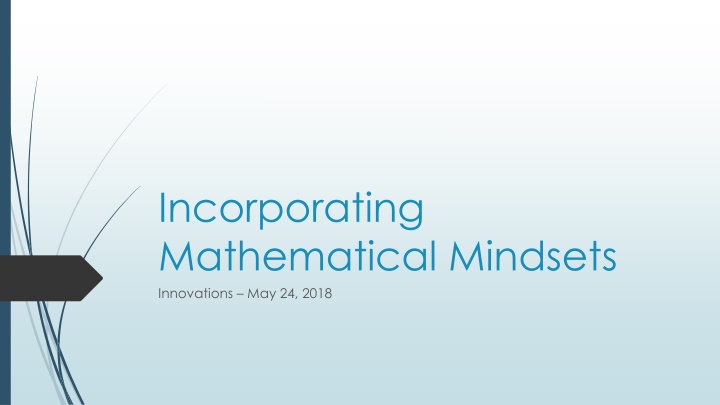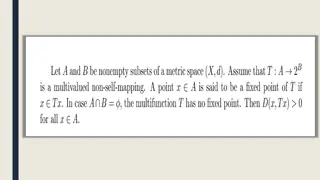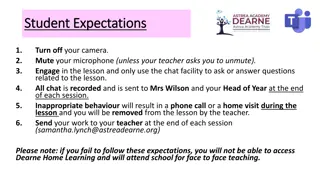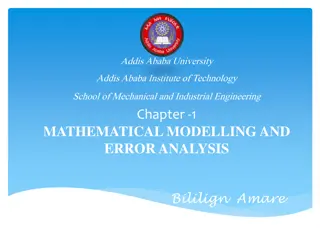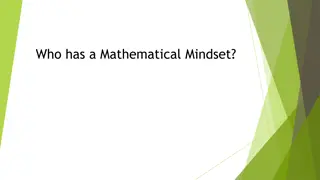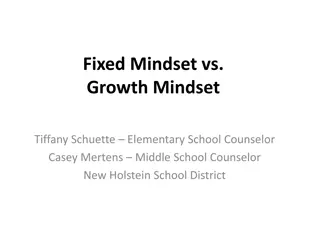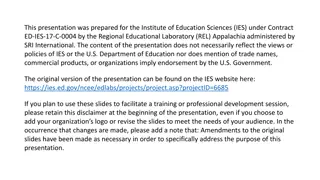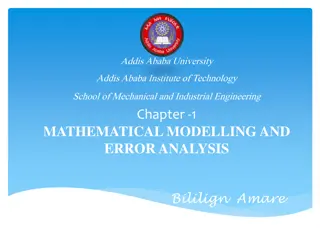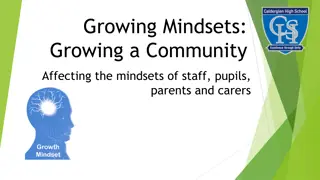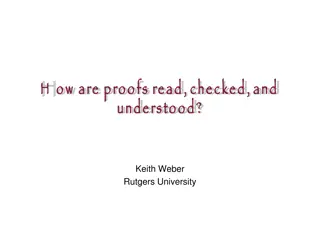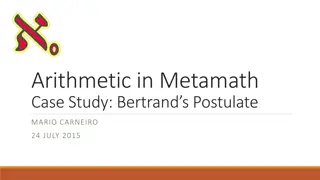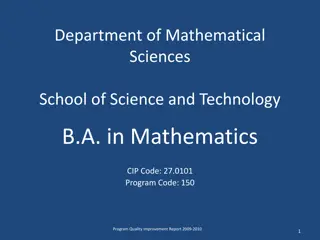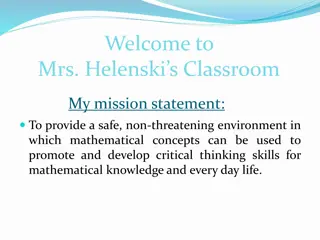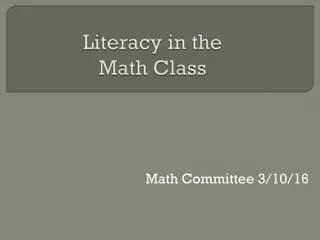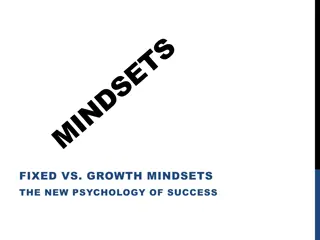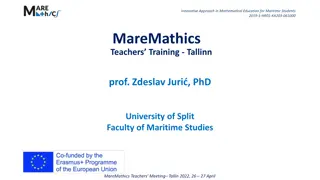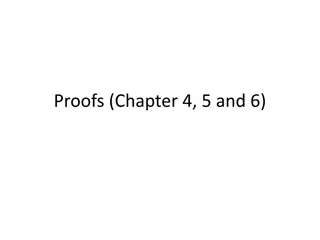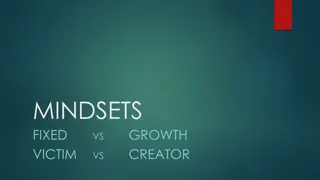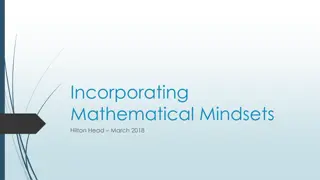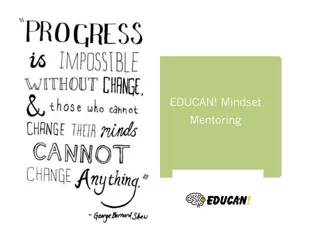Incorporating Mathematical Mindsets Innovations
Explore the power of growth mindset in learning, success, and resilience through insights from Jo Boaler and Carol Dweck. Discover the difference between fixed and growth mindsets and how they impact learning experiences and outcomes. Dive into practical strategies for fostering a growth mindset in students and yourself to promote a love of learning and continuous improvement.
Download Presentation

Please find below an Image/Link to download the presentation.
The content on the website is provided AS IS for your information and personal use only. It may not be sold, licensed, or shared on other websites without obtaining consent from the author.If you encounter any issues during the download, it is possible that the publisher has removed the file from their server.
You are allowed to download the files provided on this website for personal or commercial use, subject to the condition that they are used lawfully. All files are the property of their respective owners.
The content on the website is provided AS IS for your information and personal use only. It may not be sold, licensed, or shared on other websites without obtaining consent from the author.
E N D
Presentation Transcript
Incorporating Mathematical Mindsets Innovations May 24, 2018
Introduction Jo Boaler: A lot of scientific evidence suggests that the difference between those who succeed and those who don't is not the brains they were born with, but their approach to life, the messages they receive about their potential, and the opportunities they have to learn. The very best opportunities to learn come about when students believe in themselves.
Carol Dweck Mindset The New Psychology of Success
Jo Boaler Mathematical Mindsets
Mindsets Mindsets are beliefs beliefs about yourself and your most basic qualities (intelligence, talents, personality). - Carol Dweck Are these fixed traits, or can you grow them over time?
Fixed Mindset People believe that their intelligence and abilities are fixed traits. Talent alone creates success without effort. People in this mindset worry about their traits and how adequate they are. They have something to prove to themselves and others.
Growth Mindset People believe that their intelligence and abilities can be developed through hard work. Intelligence and talent are a starting point. This mindset creates a love of learning and resilience.
Comparing the Two Mindsets - Goals Fixed: Concerned how they ll be judged Growth: Concerned with improving
Comparing the Two Mindsets - Failure Fixed: Failure is a setback Growth: Failure is about not growing
Failure/Setback Students with a fixed-mindset will reduce their effort, leading to lower achievement. Students with a growth-mindset will work harder, leading to higher achievement. These are self-perpetuating cycles, especially in math.
Comparing the Two Mindsets - Effort Fixed: Effort is a bad thing Growth: Effort is what makes you smart and talented
Our Role Instructors are an important resource for students, and we have a great impact on student learning. Don t judge. Teach. It s a learning process.
Its Not Easy Adopting a growth mindset is about changing your view and looking at things in a different way.
Day One Survey Prompts List a mistake you made that taught you something. List a skill that you picked up that required a lot of practice. Give an example, in detail, of an area in which you once had low ability but now perform well. Tell me about a person that you saw learn how to do something you never thought that person could do.
Developing a Growth Mindset Carol Dweck: Is there something in your past that you think measured you? Focus on that thing. Now put it in a growth-mindset perspective. What did I (or can I) learn from that experience? How can I use it as a basis for growth? Carry that with you instead.
Misinterpretations Carol Dweck: A growth mindset isn t just about effort. Perhaps the most common misconception is simply equating the growth mindset with effort. Certainly, effort is key for students achievement, but it s not the only thing. Students need to try new strategies and seek input from others when they re stuck. They need this repertoire of approaches not just sheer effort to learn and improve.
Misinterpretations Carol Dweck: We also need to remember that effort is a means to an end to the goal of learning and improving. Too often nowadays, praise is given to students who are putting forth effort, but not learning. It s good that the students tried, but it s not good that they re not learning. The growth-mindset approach helps children feel good in the short and long terms, by helping them thrive on challenges and setbacks on their way to learning.
Misinterpretations The focus is on effort, not on success. Instructors using this approach are lowering standards.
Misinterpretations Carol Dweck: Many educators think that lowering their standards will give students success experiences, boost their self- esteem, and raise their achievement. Well, it doesn t work. Lowering standards just leads to poorly educated students who feel entitled to easy work and lavish praise. Simply raising standards in our schools, without giving students the means of reaching them, is a recipe for disaster.
Misinterpretations False Growth-Mindset
Messages The messages we send to our students are so important.
Messages For example Teachers need to replace sympathetic messages such as Don't worry, math isn't your thing with positive messages such as You can do this, I believe in you, math is all about effort and hard work. - Jo Boaler
Mistakes Jo Boaler I love mistakes. Every time they make a mistake their brain grows. Failure and struggle do not mean that they cannot do math these are the most important parts of math and learning.
Believe in Your Students Jo Boaler: I believe in every one of them, that there is no such thing as a math brain or a math gene, and that I expect all of them to achieve at the highest levels. I have always known how important it is that students know their teacher believes in them.
Believe in Your Students Carol Dweck The great teachers believe in the growth of the intellect and talent, and they are fascinated with the process of learning.
Speed Jo Boaler: Misconceptions about math: that math is a subject of rules and procedures, that being good at math means being fast at math, that math is all about certainty and right and wrong answers, . It is also important to realize that the speed at which students appear to grasp concepts is not indicative of their mathematics potential.
Praise Praise growth-mindset, effort-based qualities rather than fixed-mindset, talent-based qualities. When you tell a student You are smart Try using Your hard work is paying off!
Praise Jo Boaler: We know that one way we aid and abet students in developing a fixed mindset is by giving them fixed praise telling them, in particular, that they are smart. When students hear that they are smart, they feel good at first, but when they struggle and fail and everyone does they start to believe they are not so smart. They continually judge themselves against a fixed scale of smartness, and this will be damaging for them,
Praise Carol Dweck: Students were given a nonverbal IQ test. After they finished half were praised for their ability ( That s a really good score. You must be smart at this. ), and half were praised for their effort ( That s a really good score. You must have worked really hard. ).
Praise Carol Dweck: The ability-praised students rejected a challenging new task that could expose their flaws and call their talent into question. 90% of the effort-praised students wanted a challenging new task they could learn from. The performance of the ability-praised students dropped on a second test, while the performance of the effort- praised students improved.
Praise Carol Dweck: Praising children s intelligence harms their motivation and it harms their performance. The minute they hit a snag, their confidence goes out the window and their motivation hits rock bottom.
Changing Student Perceptions of Math Keith Devlin: Students will typically say it is a subject of calculations, procedures, or rules. But when we ask mathematicians what math is, they will say it is the study of patterns; that it is an aesthetic, creative, and beautiful subject
Reasoning Jo Boaler: What is the point of explaining their work if they can get the answer right? My answer is always the same: Explaining your work is what, in mathematics, we call reasoning, and reasoning is central to the discipline of mathematics.
